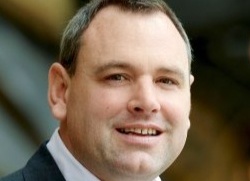IoT is still in early stages of development, say investors backing Wireless Innovation and Sabio

Simon Hitchcock, partner, Lyceum Capital
Lyceum Capital has been in the news lately. On August 16, IoT Global Network reported that the company was an investor in customer contact specialist Sabio, which has amassed a €35 million warchest. CEO, Andy Roberts told us exclusively what the company would spend it on. One week later, Lyceum was back in the headlines announcing another investment, this time in Wireless Innovation.
Here, Jeremy Cowan talks to Simon Hitchcock, partner at Lyceum, about what has sparked this strong new financial interest in the Internet of Things (IoT).
(Also see: Lyceum Capital buys IoT connectivity provider Wireless Innovation and backs new expansion.)
IoT Global Network: What was your first investment in the Internet of Things?
Simon Hitchcock: A number of our portfolio companies are in the wider IoT ecosystem including TotalMobile and Isotrak, but Wireless Innovation is our first investment purely dedicated to connectivity in the IoT market.
IoT Global Network: What persuaded you to invest now?
SH: We have been following the development of the IoT connectivity market for a number of years, looking for the right investment opportunity. Wireless Innovation represented an attractive opportunity to back an existing team to continue to grow organically at double digits and to accelerate that through acquisitions, in what remains a fragmented market.
IoT Global Network: What was it about Wireless Innovation that singled them out for you?
SH: The CEO and founder, Phil Rouse, has achieved very impressive organic growth, which the business is well positioned to continue. Other factors included its high quality and well invested connectivity management platform, and comprehensive managed service offering, as well as the wide range of clients and end markets it serves.
IoT Global Network: How much have you invested and what’s it for? Acquisitions? If so, what kind?
SH: Lyceum Capital has committed £20 million (€21.7 million) of funding to the buy and build. We plan to acquire complimentary businesses to expand the geographic and sector reach of the investment.
IoT Global Network: Is this a fixed-term or open-ended investment? If fixed, for how long? If open, what are your objectives?
SH: Lyceum Capital is a long-term investor, typically holding our portfolio companies for a minimum of five years. Our plan is to develop Wireless into a leading player in the market.
IoT Global Network: What do you look for in IoT investments? Are there any golden rules?
SH: We focus on businesses with high recurring revenues, mission-critical use cases, strong organic growth and strong gross margins. We like businesses that have developed a level of their own IP and real value-add in their service wrap.
IoT Global Network: Do you plan further IoT / M2M (machine-to-machine) investments in the near term?
SH: We plan to make a number of acquisitions for Wireless Innovation, both in the UK and internationally in the coming years.
IoT Global Network: Do you see other investors looking at the Internet of Things? If so, are they larger or smaller investors?
SH: The growth in the IoT market makes it attractive for investors, we would expect a range of different investors to be attracted to it for this reason.
IoT Global Network: How are IoT / M2M services and technologies viewed by investors?
SH: We view the market as still being in the early stages of its development, although it has come a long way. We see significant short-, medium- and long-term growth potential in it as costs reduce and use cases increase.
Jeremy Cowan, editorial director of IoT Now and VanillaPlus, was talking to Simon Hitchcock, a partner at Lyceum Capital.
Comment on this article below or via Twitter @IoTGN

